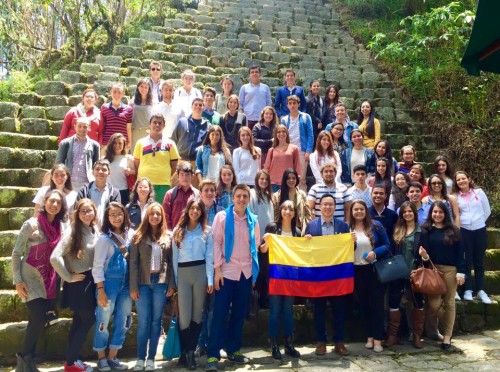
Colombian delegates at the Crisis workshop taught by Best Delegate
I had three takeaways from this workshop:
1. Crisis needs some standard foundations.
One of the reasons I was brought in to teach crisis in Colombia was because crisis is already catching on in Colombia. But because many MUN leaders have yet to have much exposure to crisis committees, the crisis committees were all being designed differently. In other words, the circuit needed some standard foundations so that all participants knew what to expect in terms of the basics of the simulation.
That said, the same could be said for the North American circuit. As I found out when training the crisis curriculum to our Model UN Institute Diplomacy Fellows last summer, there was a lot of inconsistency in terminology and how crisis committees should be simulated. For example, Diplomacy Fellows from different universities would call the same thing a note vs. a personal directive vs. a portfolio request. So despite the North American crisis circuit being the most established, it could probably use some basic standardization much like how GA simulations are relatively standardized.
2. Moderated caucus is the most effective default debate method for crisis.
Colombian delegates were surprised to learn that you could write secret personal directives. They thought that it would be challenging to do this in crisis. I soon found out the reason why is because their default crisis debate method is unmoderated caucus. Delegates would be talking to them or looking at them if they tried to write a secret personal directive — of course it’d be awkward to write one!
I think moderated caucus it the most effective default debate method for crisis. Compared to unmoderated caucus, it allows for more structure in discussions and as mentioned above, it allows for more personal directives to be written. Also, compared to Open Debate, which is the debate format I’ve seen some THIMUN-centric clubs attempt to implement crisis elements, the moderated caucus is a lot faster in allowing for many speakers whereas Open Debate feels too slow (akin to the speed of a speakers list given that it allows points of information and yields).
3. Crisis directives can be very relevant.
One of the biggest laughs I got during the workshop was when I mentioned “exporting democracy” as an example of a crisis directive. To Americans, we’re often accused of doing this but I think most delegates feel disconnected from the effects of it because we’re never on the receiving end of this “directive.” But if we imagined a USA-Colombia historical JCC, the US Cabinet literally did that to the Colombian Cabinet to create Panama. So to the Colombians, the “exporting democracy directive” was very real.
The cool thing is that a lot of actions that may seem outrageous in crisis committees are actually real. The important thing that delegates should remember is that these actions — drone strikes, assassinations, kidnappings, etc. — actually impact real lives. Crisis Sunday sessions tend to recap what happened behind-the-scenes in the simulation, but it could be improved by adding some educational component for participants to understand the impact of their decisions in real life.
**
This was my first workshop in South America, and I’m excited for future opportunities to teach there. Colombians are very passionate about Model UN, and many of them already mentioned about potentially attending HNMUN, UPMUNC, ChoMUN, and other conferences where they could experience crisis committees.
Thanks to Best Delegate Model UN Institute alumna and Best Delegate Community Editor Natalia Daza for organizing the workshop!


